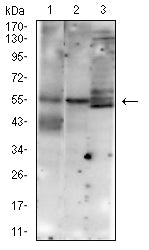
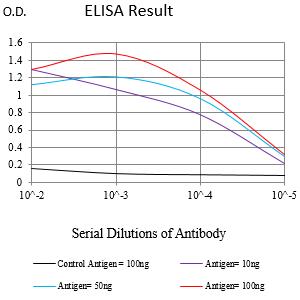
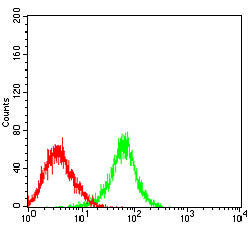
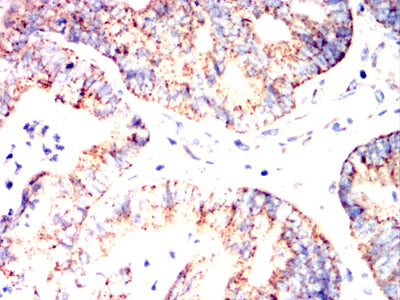
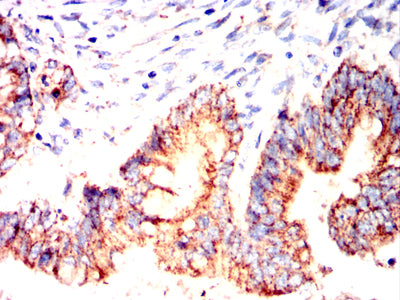
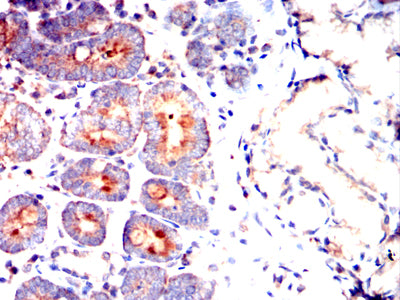
| WB | 1/500 - 1/2000 | Human,Mouse,Rat |
| IF | 咨询技术 | Human,Mouse,Rat |
| IHC | 1/200 - 1/1000 | Human,Mouse,Rat |
| ICC | 技术咨询 | Human,Mouse,Rat |
| FCM | 1/200 - 1/400 | Human,Mouse,Rat |
| Elisa | 1/10000 | Human,Mouse,Rat |
| Aliases | DRCC1; MUC-13 |
| Entrez GeneID | 56667 |
| clone | 8B2C4 |
| WB Predicted band size | 54.6kDa |
| Host/Isotype | Mouse IgG1 |
| Antibody Type | Primary antibody |
| Storage | Store at 4°C short term. Aliquot and store at -20°C long term. Avoid freeze/thaw cycles. |
| Species Reactivity | Human, Mouse |
| Immunogen | Purified recombinant fragment of human MUC13 (AA: extra 19-238) expressed in E. Coli. |
| Formulation | Purified antibody in PBS with 0.05% sodium azide |
+ +
以下是关于MUC13抗体的3篇示例性文献(注:部分信息为示例性概括,具体文献需通过学术数据库检索确认):
---
1. **文献名称**:*MUC13 promotes colorectal cancer development through activating Wnt/β-catenin signaling*
**作者**:Wang Y, et al.
**摘要**:本研究利用MUC13特异性抗体检测其在结直肠癌组织中的表达,发现MUC13过表达与Wnt信号通路激活相关,促进肿瘤增殖和侵袭,提示其作为潜在治疗靶点。
2. **文献名称**:*Development of a monoclonal antibody against MUC13 for gastric cancer diagnosis*
**作者**:Li H, et al.
**摘要**:报道了一种新型抗MUC13单克隆抗体的开发,验证其在胃癌组织中的高特异性结合能力,表明该抗体可用于临床病理诊断及预后评估。
3. **文献名称**:*MUC13 as a novel biomarker in pancreatic ductal adenocarcinoma: Insights from immunohistochemical analysis*
**作者**:Smith J, et al.
**摘要**:通过免疫组化(使用抗MUC13抗体)分析胰腺癌样本,发现MUC13表达与患者生存率负相关,支持其作为胰腺癌生物标志物的临床价值。
---
建议通过 **PubMed** 或 **Google Scholar** 检索关键词“MUC13 antibody”“MUC13 cancer”等,获取最新、具体的研究文献。
The MUC13 antibody targets the MUC13 glycoprotein, a transmembrane mucin involved in cell signaling and protection of epithelial surfaces. MUC13 is characterized by extracellular tandem repeats, cysteine-rich domains, and a cytoplasmic tail with phosphorylation sites, enabling interactions with signaling molecules like EGFR and β-catenin. While expressed in normal gastrointestinal and respiratory tissues, MUC13 is frequently overexpressed in cancers (e.g., colorectal, pancreatic, ovarian) and linked to tumor progression, metastasis, and chemotherapy resistance. Its aberrant expression correlates with poor prognosis, making it a potential diagnostic and prognostic biomarker.
MUC13 antibodies are primarily used in research to detect MUC13 expression via techniques like immunohistochemistry, flow cytometry, and Western blot. Therapeutic applications are under exploration, with studies suggesting antibody-mediated targeting could inhibit oncogenic pathways or deliver cytotoxic agents. However, challenges include overcoming MUC13's structural complexity, glycosylation variability, and understanding its context-dependent roles in tumor microenvironments. Current efforts focus on developing monoclonal antibodies and evaluating their efficacy in preclinical models, aiming to translate findings into targeted therapies or companion diagnostics for MUC13-associated cancers.
×